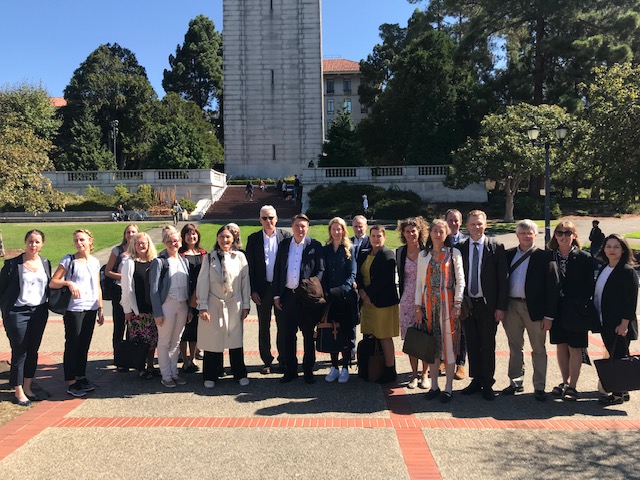The CALIE project (Collaboration, Academic Leadership & Innovation in Higher Education) brings together four broad-based research universities in Sweden (Gothenburg, Lund, Stockholm and Uppsala) and three leading American universities (UC Berkeley, Stanford University and the University of Washington). The aim is to learn from one another how we can develop the capacity of our universities to meet challenging changes in society, not least through educational innovation.
At a kick-off meeting last week, the focus was on Berkeley and Stanford. Representatives of Berkeley described the process that had led to their ‘signature initiatives’ – five broad cross-disciplinary initiatives that encompass both research and education. The five themes identified have a familiar ring to us in Uppsala:
- Artificial intelligence – and its impact in the world of work and in science
- Health and ageing
- Environment and climate change
- Threats to democracy
- Unequal opportunities/inequality and its consequences in society
The extensive contract education conducted by UC Berkeley Extension is impressive. A highly interesting discussion also arose about building a platform for more regular researcher exchanges between Berkeley and the Nordic countries/Sweden, based around the five signature initiatives. The US participants expressed a particular interest in studying the – globally speaking, successful – Nordic model for tackling sustainability challenges and climate policy.
All comparisons between Stanford and Swedish universities have to bear in mind the quite staggering differences in operating conditions. Stanford, with 17,000 students (most of whom are Master’s or PhD students), has an annual turnover virtually equal to that of the entire Swedish higher education sector. Another fundamental difference is that Stanford’s ‘business model’ is so clearly about giving students value for all the money they pay for their education, and not least about building strong and lifelong ties of loyalty to guarantee future donations that will finance everything from scholarships to buildings and new research initiatives. What is most impressive is how consistently they strive to ensure quality through tremendously careful recruitment processes, for both academic staff and students.
Berkeley and Stanford share an emphasis on giving all students, including humanities and social sciences students, basic ‘computational literacy’. The future belongs to social scientists who can count, asserted a leading representative of Stanford (with a background in engineering). Another exciting Stanford initiative, Social X-Change, aims to enable social scientists to engage in ‘co-creative research’ aimed at solving specific problems in society.

Uppsala’s project team is led by the Deputy Vice-Chancellor and includes representatives of the disciplinary domains, the Division for Quality Enhancement, the Division for Internationalisation and the students’ unions.
